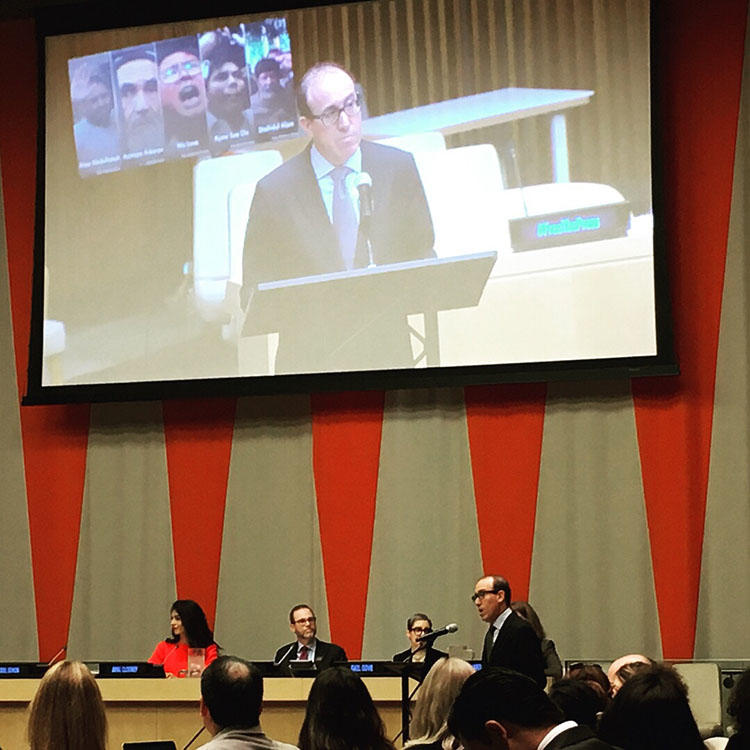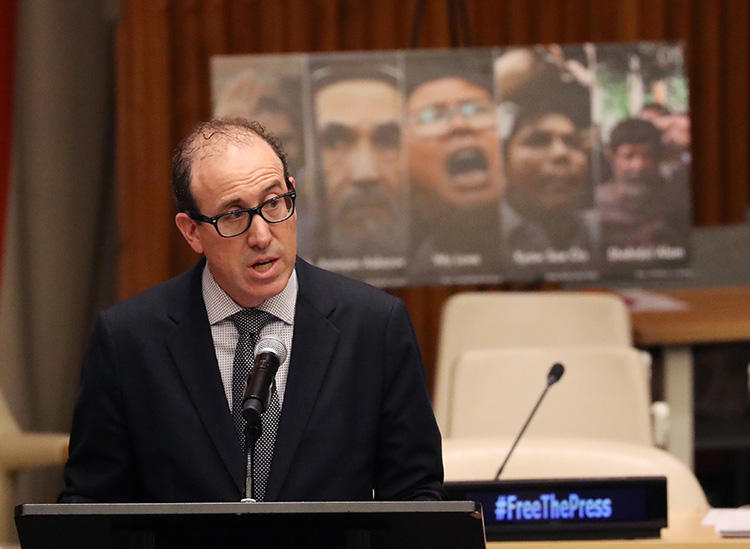Committee to Protect Journalists Executive Director Joel Simon addressed a panel event at the 73rd session of the U.N. General Assembly in New York on September 28, 2018. The event highlighted global press freedom violations and the jailing of journalists in countries around the world, with a specific focus on cases in Egypt, Kyrgyzstan, Bangladesh, and Myanmar.
Here are his remarks, as prepared for delivery:
Good morning, I’m Joel Simon, executive director of the Committee to Protect Journalists. CPJ is an international organization that promotes press freedom around the world and defends the right of journalists to report the news without fear of reprisal.
Over many years, we’ve engaged with the U.N. and its agencies and institutions on a number of matters relating to press freedom and the rights of the journalists. For example, we’ve met with the last several Secretary Generals to express deep concern about the murders of journalists around the world and the issue of impunity. We’ve discussed the protection of journalists working in conflict zones. We have been pleased to see an increasing willingness to speak out on these issues, even while we acknowledge that conditions have not changed much for journalists on the ground.
But there is one issue in which it has been difficult to engage with the U.N. And that is around the unjust imprisonment of journalists throughout the world. That is because governments are directly responsible for this grave abuses, and the U.N. has a culture of rarely calling out its members. But the jailing of journalists has reached unprecedented levels. At the end of last year, there were 262 journalists jailed around the world, the highest number ever recorded by CPJ. The jailing of journalists is a brutal form of censorship and is having a profound impact on the flow of information around the world. The time has come to speak out and to name names.

At the end of last year, Turkey was the leading jailer of journalists, with 73 journalists behind bars. China was second with 41, followed by Egypt with 20. Together these three countries jail 134 journalists, more than are imprisoned in all of the rest of the world.
At today’s event we want to talk not just about the numbers. We want to talk about the journalists themselves. The journalists we will highlight today are reporters who have sacrificed their liberty to keep their communities and the entire world informed. We’ve selected five cases in which we believe sustained international attention can make a difference. The journalists come from Bangladesh, Kyrgyzstan, Egypt, and Myanmar.
I want to start with Reuters reporters Wa Lone and Kyaw Soe Oo, who are jailed in Myanmar. These two journalists have been sentenced to seven years in prison on retaliatory charges of violating Myanmar’s colonial-era Officials Secrets Act. Working for an international news organization, they reported on a story of profound global significance. Their unjust imprisonment not only violates their own individual rights, it violates the rights of everyone is this room and even around the world.
Each of us, under Article 19 of the Universal Declaration of Human Rights, a foundational U.N. document, has the right to seek and receive information through any medium and regardless of frontiers. But how can we do so when the people who are informing us are being imprisoned for their efforts? As world leaders gather in New York this week for the U.N. General Assembly, the issue needs to feature squarely on the agenda.
The list of journalists jailed around the world is long. In fact, it’s never been longer. But I want to focus now on three other journalists from that list who like Wa Lone and Kyaw Soe Oo are unjustly jailed in reprisal for reporting on stories of global significance.
Shahidul Alam is a renowned photojournalist, commentator, and founder of a Bangladeshi multimedia organization. His photographs of street life, political protest, and Bangladesh’s ecological challenges have captivated his country and the world.
Last month Shahidul was arrested while covering student protests in Bangladesh. A day later, a Dhaka court ordered that he be held for seven days to determine if he violated Section 57 of the Information and Communication Technology Act by spreading propaganda and false information. When Shahidul was brought into court, he screamed that had been tortured. He was unable to walk without assistance. Nearly two months later, he remains behind bars.
As with Wa Lone and Kyaw Soe Oo, Shahidul’s case is rife with due process violations. The American Bar Association Center for Human Rights released a report that concluded “the entire criminal process against Dr. Alam has been only a means of intimidation and retaliation and a gross subversion of the Bangladesh justice system.”
Around the world, 52 percent of all journalists imprisoned are in jail for reporting on human rights violations. Azimjon Askarov is another example. Askarov is a journalist and human rights defender in Kyrgyzstan who has been sentenced to spend the rest of his life in jail. He has already been in prison since July 2010.
Askarov’s crime? Covering deadly ethnic clashes between Kyrgyz and Uzbeks in southern Kyrgyzstan in summer 2010.
During his trial, Askarov and his lawyer were assaulted. Exculpatory testimony from his wife and neighbors was ignored. CPJ conducted its own investigation into the case in 2012 and found that charges against Askarov were in retaliation for his reporting on corrupt and abusive practices by regional police and prosecutors. Askarov himself told CPJ that authorities had long threatened him, probably because he had exposed fabricated criminal cases, arbitrary detentions, and the rape and abusive treatment of detainees in his native Jalal-Abad region.
The U.N. Human Rights Committee looked into Askarov’s case, and found that numerous violations took place between the day of his arrest and sentencing. In early 2016, the body called on Kyrgyzstan to release Askarov.
This summer, CPJ asked for permission to visit Askarov in prison. The Kyrgyz government said no. Today, we are calling on President Jeenbekov to use his authority to free Askarov and unequivocally commit to protecting press freedom. We also call on member states to insist that President Jeenbekov and the Kyrgyz government comply with the recommendations of the U.N. Human Rights Committee.
It is beyond sad that media repression continues to mount in Egypt. Since 2013, the country has been among the world’s worst jailers of journalists, according to CPJ research. Of the 20 journalists in Egyptian jails last year, some face politically motivated anti-state charges. Others face charges for publishing false news.
Among them is Alaa Abdelfattah, a prominent blogger and activist who has written about politics and human rights for numerous outlets. Alaa is serving a five-year prison sentence on charges that he organized a protest and assaulted a police officer.
We believe the charges are trumped up and in retaliation for Alaa’s coverage of alleged human rights abuses by the police and security forces.
We hope that Alaa will be released soon. But even when that day comes his ordeal will not be over because of draconian parole conditions that would require him to spend each night in a local police station. Photojournalist Mahmoud Abou Zeid, known as Shawkan, is an object lesson in the absurdity of the Egyptian criminal justice system. Shawkan was arrested in 2014 and held for five years without charge. He was recently convicted, but sentenced to time served. But he has still not been released.
Governments around the world routinely use emergency laws to censor media outlets and publications. Increasingly, they also bring “fake news” charges against journalists who contradict official statements. They try journalists in military courts, and hold them in pretrial detention indefinitely. These are all actions that contradict international human rights law and the standards set by the U.N.
Few countries have been held to account for their repressive practices. One of the reasons is that key international bodies like the United Nations and its member states follow arcane diplomatic protocol and refuse to name names. Even leading democracies abide by this absurd custom. Why are they afraid to stand up for their values?
The General Assembly must be more than a parade of speeches. The U.N. has taken up the issue of the journalists’ safety, through a series of resolutions, a plan of action, and the engagement of the Secretary General’s office. We are grateful for those efforts. But today we are asking the U.N. to expand its engagement in response to the record number of journalists imprisoned around the world. And we are asking member states that support press freedom to speak out about these abuses and demand answers. The jailing of journalists around the world is successfully censoring coverage of key global issues and violating our collective right to seek and receive information vital to public understanding. It’s an issue the U.N. can no longer ignore.
